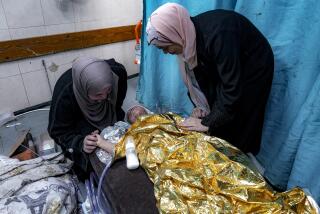Postcript : Orphans Continue to Haunt Romania : ‘Ceausecu’s children’ are more apparent than ever--despite the influx of foreign charity.
- Share via
BUCHAREST, Romania — Hiding under a cafe table at the edge of the Gara de Nord train station, Gigi Tutunaru gnaws at a bruised green apple he has finagled from a charwoman. The juice trails in brown rivulets along the palms of his filthy hands. He absently laps up the muddy drippings while his quick, dark eyes scan the crowd of travelers for a promising source of another handout.
The 9-year-old, rag-clad urchin sleeps in idled railroad cars each night and spends his days darting among the station’s warren of shabby kiosks to beg or pilfer enough to eat.
He doesn’t know if he has a family or how long he has been living on the streets; he shrugs with an adult air of indifference to questions about both his present lifestyle and his past.
Gigi is one of an estimated 4,000 homeless children scavenging an existence on the stingy streets of Romania’s biggest cities. Rather than disappearing apace with the development of charities and the influx of foreign aid, street kids are actually multiplying amid the confusion of freedoms and failings in the post-Communist age.
The growing number of child beggars and vagabonds visible on city streets is only one of many troublesome trends worrying aid workers dedicated to improving the sad lot of young Romanians who have come to be known as “Ceausescu’s children.”
Neglected state institutions warehoused as many as 200,000 unwanted children when Romanians revolted in December, 1989, against dictator Nicolae Ceausescu and his depraved quest to boost the national population by outlawing birth control and abortion.
After Ceausescu’s ouster and execution, the advent of family planning quickly decreased the number of newborns being abandoned on the state’s hostile doorstep. Thousands of adoptions by foreigners further depleted the stock of hapless wards of the state, until the practice was suspended a year ago to curb abuses that had fostered an unscrupulous baby-selling market.
However, said Luminita Marcu, a child welfare specialist with the Department of Health, “Now, after two years of decline, the number of children being abandoned is going up again. Some parents are putting their children in orphanages because they cannot take care of them.”
The growing problem of “economic orphans” is just part of a decidedly mixed picture for Romanian children confirmed by social workers and foreign volunteers throughout Romania.
Largely due to the influx of foreign aid that followed shocking documentaries on Romanian orphanages shortly after the revolution, conditions have improved in many state homes, especially those for the youngest children.
The British-based Romanian Orphanage Trust, for example, has been working closely with 23 orphanages across the country to improve plumbing, heating, staff training and other basics.
But Pauline McKeown, the trust’s director of child care, as well as other social workers here, concede that progress on improving institutional care has been slow because of Romania’s staggering economic woes. Romanians have been unable to shoulder as much of the responsibility for social services as in other Eastern European countries where the economic transition has been somewhat smoother.
Average monthly income here is less than $50, and inflation is galloping at an annual rate topping 700%, which has the majority of families struggling just to eat.
At the same time, there’s new competition for Western philanthropy from famine-racked Somalia and the hungry and isolated young victims of ethnic warfare in the former Yugoslavia.
“There’s so much going on in the world currently that people’s attention for giving is split,” said Fiona Nicol, a publicist with the orphanage trust on a fund-raising campaign in Romania.
Donations for Romanian children have fallen sharply in recent months from the outpouring that occurred in 1990 when Western media carried shocking reports of the conditions to which Romanian orphans were exposed. The severely handicapped were often chained to urine-soaked mattresses and paid no attention beyond brutal force-feedings.
“Now that people don’t see pictures of children banging their heads against their cribs, (the charities) are not getting the same level of donation,” said Nicol, who was trailing pop superstar Michael Jackson on his recent Bucharest visit in hopes of securing further help from his Heal the World foundation.
Bucharest authorities are hard pressed to provide accurate figures of the number of children in institutional care, but McKeown estimates that there are 8,000 in homes for infants and toddlers and 27,000 in homes for sick and handicapped children ages 3 to 18.
Those estimates do not include the masses of older children and teen-agers living in Education Ministry boarding schools, most of whom were abandoned by alcoholic or destitute parents. It is from those schools that many of today’s street kids have fled, preferring a rough life on their own to the cruel pecking order that develops in the poorly staffed and underfunded state homes.
Valentin Oancea, program coordinator for Bucharest’s Save the Children foundation, says runaways from state homes see life on their own as an expression of newfound freedom.
“We’re finding it very difficult to care for street kids because of their wild habits,” Oancea said. “These children have usually grown up too fast and have never been obliged to any schedule. They see any effort to get them to stop spitting or use the toilet or go to school as an infringement on their freedom.”
After bad experiences trying to resettle street kids in state homes, Save the Children has changed tactics. It visits street-kid hangouts such as the train and subway stations, offering counseling to those who can still be salvaged from a life of theft, prostitution and drugs.
“We have one school here in Bucharest where we have established a photo studio, and the older children are proving to be quite accomplished,” Oancea said. “We would like to offer a kind of apprenticeship program that would place them in private shops where they could earn money and develop job skills.”
But that program awaits legislative action by a Parliament that has paid little attention to social welfare programs.
National elections last month produced an even more divided legislature, threatening to further delay bills and amendments that aid agency workers claim are necessary to keep chipping away at the mountain of problems afflicting Ceausescu’s children.
More to Read
Sign up for Essential California
The most important California stories and recommendations in your inbox every morning.
You may occasionally receive promotional content from the Los Angeles Times.














